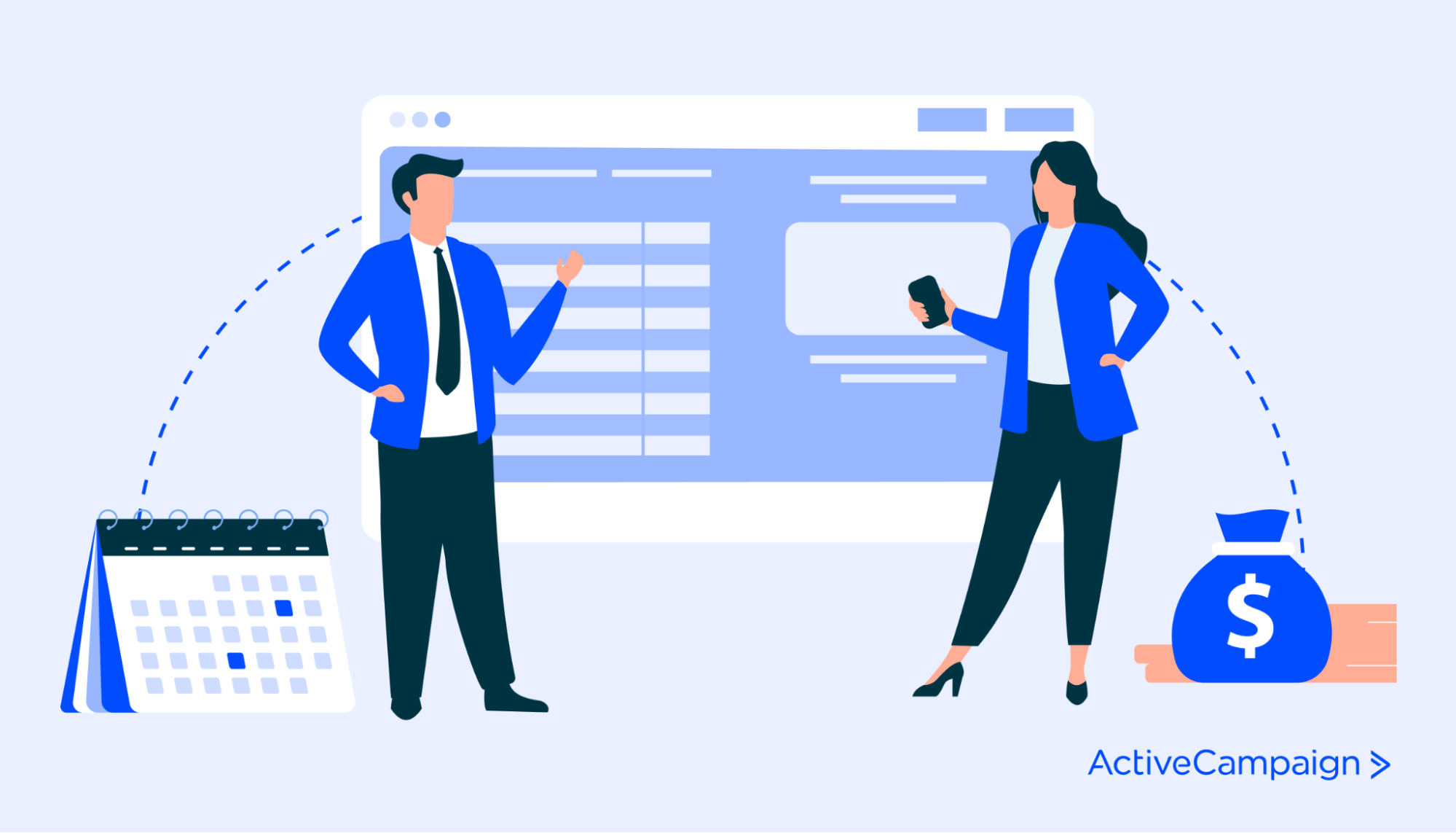No products in the cart.
Email Marketing
Why You Want One + 5 Nice Choices
As organizations scale, they amass a huge amount of customer data.
For each customer you speak to (whether you end up doing business with them or not), you’re capturing details like their name, email, contact number, and company profile.
That’s easy enough to keep in a spreadsheet if you’ve only got a few dozen customers. But once you’re looking at over 1,000 buyer profiles with the attached data, you’re gonna need a bigger boat.
A customer database is the solution that houses all of this information, typically found in a dedicated customer database software package doubling as your CRM and lead nurturing solution.
In this article, we’ll cover the ins and outs of customer databases, from the benefits of using one to the top 5 software platforms to use for your business.
Table of contents
What is a customer database?
A customer database is a digital space where you store all the information you’ve collected on your customers. It typically includes customer data like:
- Names
- Contact details (emails, phone numbers, etc.)
- Purchasing history
- User behavior
- Company data (such as headcount and annual revenue)
- Demographic information (like their age, role, and gender)
At the most basic level, customer databases are managed in tools like spreadsheets or even written on pieces of paper.
However, such solutions are largely inefficient for most organizations, who then turn to dedicated software tools to store and manage customer data.
Such storage solutions will look a bit like this offering from ActiveCampaign:
ActiveCampaign Customer Database
Make sure it is organized and intuitive for whatever approach you choose, paper or platform. In other words, make sure it is easy to update and access. There is little point in using a database that actually decreases your efficiency.
What is a customer database used for?
Let’s walk through a common customer journey to understand how customer databases function.
An individual has a problem and decides to purchase a product or service similar to yours to solve it.
They learn about your brand through internet research or word of mouth and decide to reach out to learn more.
This is the first point of data capture, where you collect basic information like their name, phone number, and email address.
Then a sales rep opens up a conversation to learn more about the prospect’s need and expands the information you have on that individual to include details such as requirements and firmographics.
The customer eventually purchases from you and does so repeatedly. Now, your customer data is supplemented by user behavior and purchasing information.
All this data is stored in your customer database, which is centralized and easily accessible.
However, databases are not just used to store data. They can also draw out key insights to help you sell and market better.
For example, by filtering for specific characteristics, you’ll better understand the kinds of customers who need your product or services. Then you can leverage these insights to inform sales conversations, marketing messaging, and targeting.
Learn more about developing a customer database in our guide: What is a CRM Database? The Ultimate Guide.
Why use a customer database software platform?
While it is possible to use basic solutions like spreadsheets to manage customer databases, they’re ineffective for most organizations.
That’s because they lack the sophistication of dedicated customer database tools, like advanced data filtering, AI-powered insights, deep security features, and automation functionality.
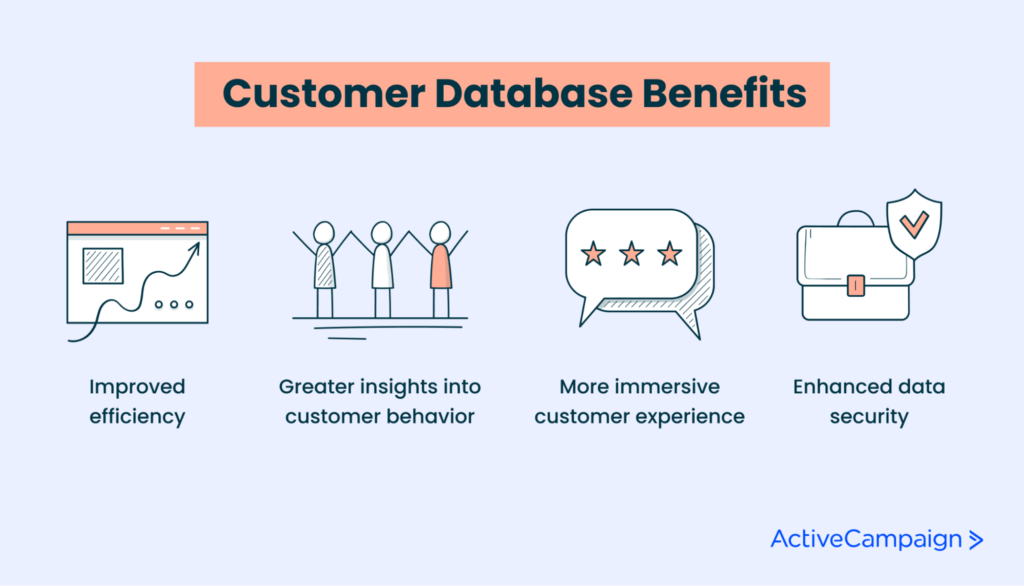 Customer Database Benefits
Customer Database BenefitsDigitized customer databases offer the following benefits.
1. Improved efficiency
A customer database platform makes capturing, storing, managing, and manipulating customer data more efficient.
For instance, most tools offer some form of reporting and analytics functionality, allowing you to pull out important insights at a glance.
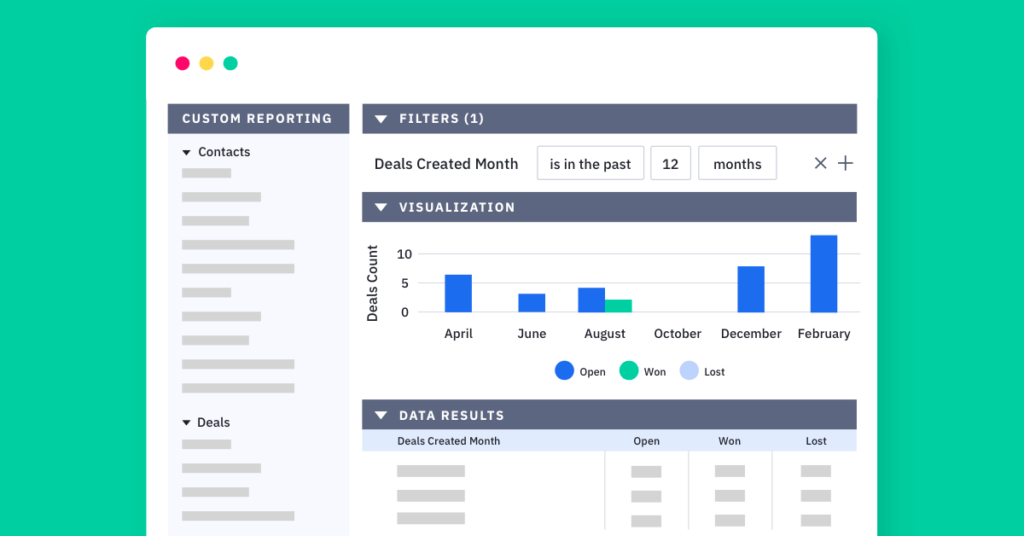 ActiveCampaign Reporting
ActiveCampaign ReportingThese insights can help you make more informed business decisions.
2. Greater insights into customer behavior
A dedicated customer database tool affords you greater insights into how your customers behave.
For instance, your software platform may allow you to drill down into data to understand the key motivators behind purchases or your software tool’s most commonly used features.
3. More immersive customer experience
Deep and well-managed customer databases make it easier for marketing teams to develop immersive and personalized omnichannel experiences.
For instance, you can use the data you have on a prospect to create personalized landing pages or to plug them into more relevant email nurture campaigns.
4. Enhanced data security
Spreadsheets offer little protection for customer data. But a CRM platform designed to host customer data is generally equipped with security protections like data encryption.
This helps you feel certain that your customers’ information is kept safe and makes it easier to comply with data safety legislation like the GDPR—a legal framework that companies must follow when collecting personal data from EU-based individuals.
Top 5 customer database software platforms
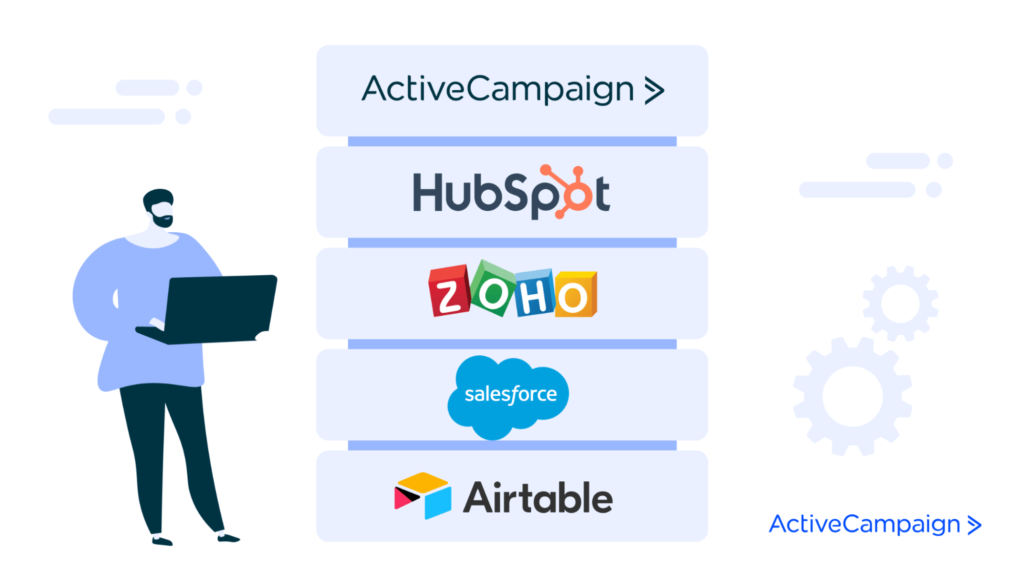 5 Customer Database Platforms
5 Customer Database PlatformsYou need a dedicated customer database software platform to effectively and efficiently manage customer data.
Here, we’ll review the top 5 options for customer database software solutions so that you can choose the best solution for your company’s needs.
1. ActiveCampaign
ActiveCampaign is a customer experience automation platform with diverse features to help sales, marketing, and customer support teams improve the experience clients have when they interact with your business.
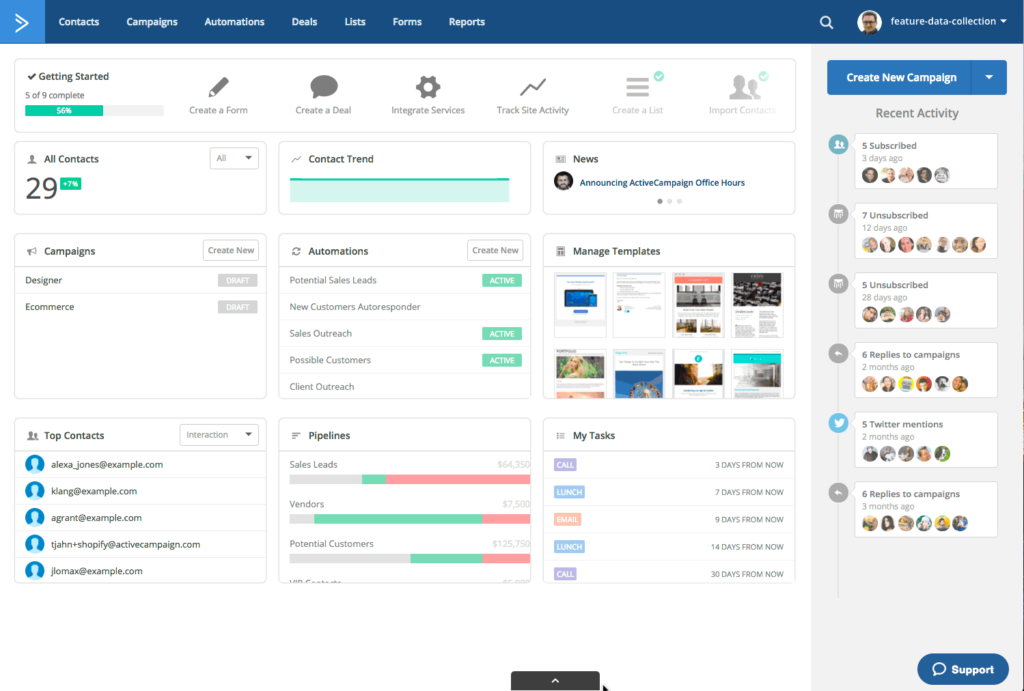 ActiveCampaign CRM Database
ActiveCampaign CRM DatabaseAt the center of this powerful suite of tools is a CRM that acts as your customer database and an advanced lead management platform.
Key features for customer database management include:
- Robust sales automation to speed up workflows and drive growth more efficiently
- Contact management functionality, such as automated communication playbooks
- An intuitive drag-and-drop editor and powerful search tools to quickly locate customer data
- Integrations with tools you’re already using, like Gmail and Outlook
- Compliance with international data protection and security legislation
ActiveCampaign’s customer database capabilities are supplemented by a wide variety of marketing and sales tools, like email marketing automation, personalized customer service portals, and transactional emails to support ecommerce buying journeys.
It’s best for small and medium-sized organizations looking to scale fast and create a more cohesive and immersive customer experience.
Pricing for ActiveCampaign starts at just $9 per month for databases of 500 contacts or less and increases based on the features you require and the size of your customer database.
For an average-sized database of 1000 contacts, pricing plans look like:
- Lite: $29 per month
- Plus: $49 per month
- Professional: $149 per month
- Enterprise: Custom pricing
Make The Most Of Your Customer Database
Easily import and manage your customers starting with a 14-day free trial of ActiveCampaign.
2. HubSpot CRM
HubSpot offers a suite of marketing, sales, and customer support tools, one of which is a CRM platform that you can use to manage your customer database.
HubSpot CRM offers all of the standard CRM features you’d expect, such as:
- Sales pipeline management
- Email integrations
- Call tracking
- Reporting and analytics
- Meeting scheduler
There are 2 big ticks in the pro column for HubSpot CRM. First of all, there’s a free version available, making it a great option for those on a super tight budget.
Secondly, if you’re using HubSpot’s entire suite at the enterprise level, you have a fully integrated and connected array of tools to manage nearly all of your sales, marketing, and customer service activities.
There’s a catch, however, and it’s a pretty big one.
Though you can get in on the ground floor for free, pricing increases rapidly as you grow and need to move beyond the basic functionality included.
For example, the top tier of HubSpot CRM comes in at $1,500 a month, and that’s before you consider any onboarding fees.
Compare that to the top tier of other tools on that list, which comes in around the $150 mark, and you start to understand HubSpot’s model: get new users in on the free plan, nurture the relationship, and drive them up to an expensive plan once they’re already locked into the platform.
3. Zoho CRM
Zoho, like HubSpot, offers a huge array of marketing and sales tools. One of these tools is a CRM which doubles as a customer database.
Key features of Zoho CRM include:
- Customer segmentation
- Automated workflows
- Reporting and analytics suite
Beyond simple CRM functionality, Zoho integrates with a powerful suite of software such as omnichannel marketing, sales enablement, and team collaboration tools.
There are 4 pricing tiers available for Zoho CRM:
- Standard: $12 per user per month
- Professional: $20 per user per month
- Enterprise: $35 per user per month
- Ultimate: $45 per user per month
4. Salesforce
Few who work in sales and marketing haven’t heard of Salesforce. It’s one of the oldest, and therefore most widely used, CRM platforms as well, and works well as a customer database for enterprise-grade companies.
As a customer database platform, Salesforce offers the following features:
- Reporting and analytics
- Deep integrations with virtually any software platform you’re using to support marketing and sales
- A powerful customer engagement tool using Slack
As a general rule, Salesforce is best used by enterprise-level companies. It’s a complex tool with many features, but it can be confusing and difficult to set up for smaller organizations, especially if you haven’t used a CRM platform before.
Due to Salesforce’s wide feature set, pricing is built on a per-customer basis, meaning we cannot share cost details.
5. Airtable
Airtable is a no-code app builder designed to allow sales and marketing teams to build table and spreadsheet-style software tools that suit their individual requirements.
If you’re used to using spreadsheet tools like Microsoft Excel or Google Sheets to manage your customer database, Airtable should be an easy transition into the world of collaborative platforms.
Notable features include:
- Sales and marketing automation functionality
- Drag-and-drop app builder
- Deep integrations with many of the tools you’re already using
- High-level reporting features
- Multiple views allow different team members to visualize data in a way that makes sense for them
Airtable has a free plan, with paid plans going for $10-20 a month, depending on the features you need. They also offer custom pricing for enterprise customers.
Frequently asked questions
What is an example of a customer database?
An example of a customer database is when a company uses a CRM platform to store all of the information they capture and store on their clients, including data such as:
- Names
- Phone numbers
- Email addresses
- Social media profiles
- Firmographics
- Demographics
- Purchasing behavior
What are the 4 types of customer data?
The 4 types of customer data are:
- Basic identify data (who they are)
- Behavioral data (how they act)
- Engagement data (how they engage with your communications)
- Attitudinal data (what they think)
How do you create a customer database?
The best way to set up a customer database is to use a CRM tool, following these high-level steps:
- Choose a software platform
- Define what kind of data you’ll collect
- Identify how you’ll capture data
- Put a data management procedure in place
Conclusion
Building a customer database is one of the best investments you can make for your company. It helps you manage customer data and provides key insights into your customers’ behaviors.
While manual solutions like spreadsheets and pen and paper can be considered customer databases, they will be ineffective and inefficient for most organizations.
If you’re serious about data security and using the information you capture to fuel better marketing, sales, and support initiatives, you’ll need a solid customer database tool.
You’ve already learned why ActiveCampaign is one of the best options for growing small and medium-sized businesses.
Why not jump in and try it yourself with our 14-day free trial?

